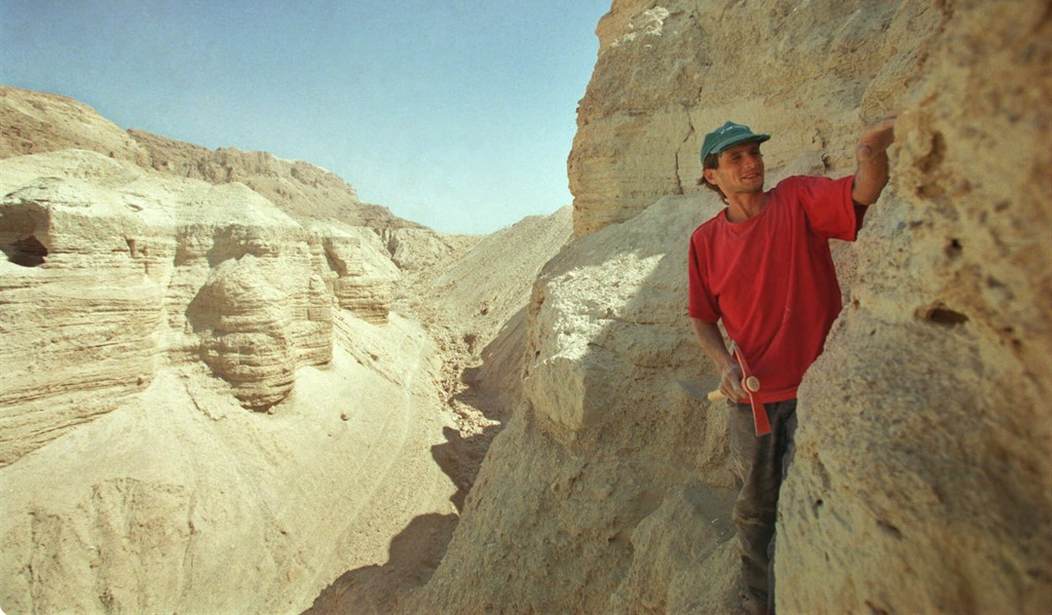Israeli archeologists have uncovered evidence of a biblical judge that dates back more than 3,000 years, the Israeli Antiquities Authority (IAA) announced on Monday. Researchers cautioned that they could not establish absolute certainty that the fragment refers to the biblical figure, but the evidence appears to back up the Bible’s narrative.
The researchers found a name inked on a jug dating back to the 12th-11th century BC, an extremely rare find, The Jerusalem Post reported. The inscription, deciphered by Christopher Rollston of George Washington University, bears five letters: yod (broken at the top), resh, bet, ayin, and lamed.
The letters spell out the name Jerubbaal, the nickname given to Gideon ben Yoash (Judges 6-8). When the messenger of God calls Gideon to be a judge (a leader of Israel), Gideon requires three signs: fire on a rock, a fleece wet with dew while the ground around it was dry, and a dry fleece while the ground around it was wet with dew.
Recommended: Archaeology Confirms King Hezekiah’s War Against Idolatry
Gideon goes on to win a massive victory against the Midianites. After God helps him winnow down his force to 300 men, he breaks them up into three different camps, and equips them with jars, torches, and trumpets. They put the fear of God into the Midianite army by smashing the jars and playing the trumpets. The Midianites, fearing that a large army had surrounded them, broke and fled, so Gideon, led by God, delivered Israel from their oppressors.
According to Judges, Gideon received the name Jerubbaal after he broke down the altar of Baal and cut down the Asherah poll beside it. Joash, Gideon’s father, asked, “Will you contend for Baal? Or will you save him? Whoever contends for him shall be put to death by morning. If he is a god, let him contend for himself, because his altar has been broken down.” According to Judges, Jerubbaal means “Let Baal contend against him.”
“The name Jerubbaal is familiar from biblical tradition in the Book of Judges as an alternative name for the judge Gideon ben Yoash,” Prof. Yosef Garfinkel and archeologist Sa‘ar Ganor from the Hebrew University of Jerusalem told The Jerusalem Post. Garfinkel and Ganor co-direct the excavations at the site with Kyle Keimer, Ph.D., and Gil Davies, Ph.D. from Macquarie University in Sydney, Australia – a partner in the dig together with the IAA.
“Gideon is first mentioned as combating idolatry by breaking the altar to Baal and cutting down the Asherah pole,” the archaeologists explained. “In biblical tradition, he is then remembered as triumphing over the Midianites, who used to cross over the Jordan to plunder agricultural crops. According to the Bible, Gideon organized a small army of 300 soldiers and attacked the Midianites by night near Ma‘ayan Harod.”
The archaeologists discovered the pot shards at Khirbet er-Ra’i, which has been excavated since 2015. The team decided to return to the site because they found certain pottery on the surface that was very similar to the artifacts discovered in Khirbet Qeiyafa, an ancient fortified city from the time of King David in around 1,000 B.C.
The site appeared to have reached its height one or two centuries earlier, at the time of the judges.
“I believe that the site was mostly inhabited by Canaanite refugees, who came to live under Philistine hegemony,” Garfinkel said.
Khirbet er-Ra’i is located close to an important archaeological site, Lachish, which appears in both the Bible and most Ancient Near Eastern texts before the period. Joshua conquers and destroys the city after the Exodus from Egypt.
While the letters of the Jerubbaal shard sound familiar to Hebrew speakers, they did not appear in the Hebrew alphabet, but in an alphabet from which the Hebrew one would later evolve.
“The alphabetic script was invented by the Canaanites and the Egyptian influence right about 1800 BCE,” Garfinkel noted. “They continued to use this script, which evolved from Egyptian Hieroglyphs in the Late Bronze Age [1500-1200 BCE] and Iron Age I [1200-1000 BCE]. The Hebrew and Phoenician scripts were developed only in the middle of the tenth century BCE.”
The non-Israelite cultural affiliation of the site does not rule out the possibility that the biblical Gideon did not own the pot from which the shard came, the researchers noted. Even if the shard refers to a different Jerubbaal, its existence shows that the name Jerubbaal dates back to the period of Gideon. Jerubbaal appears to have been an ironic nickname for Gideon, so it stands to reason that Canaanites went by the name.
Recommended: New Evidence Suggests Old Testament Testament is Older Than Skeptics Think
“In any event, the name Jerubbaal was evidently in common usage at the time of the biblical judges,” Garfinkel and Ganor explained.
Under the influence of the German Higher Criticism from the late 1800s, scholars often discount the idea that the Bible could present an accurate history of the times to which it refers. Archaeological finds in Israel like the Jerubbaal shard often reveal the folly of this notion. While these finds cannot prove the biblical text 100 percent correct, they give indications that the Bible is far more reliable than skeptics claim.









Join the conversation as a VIP Member